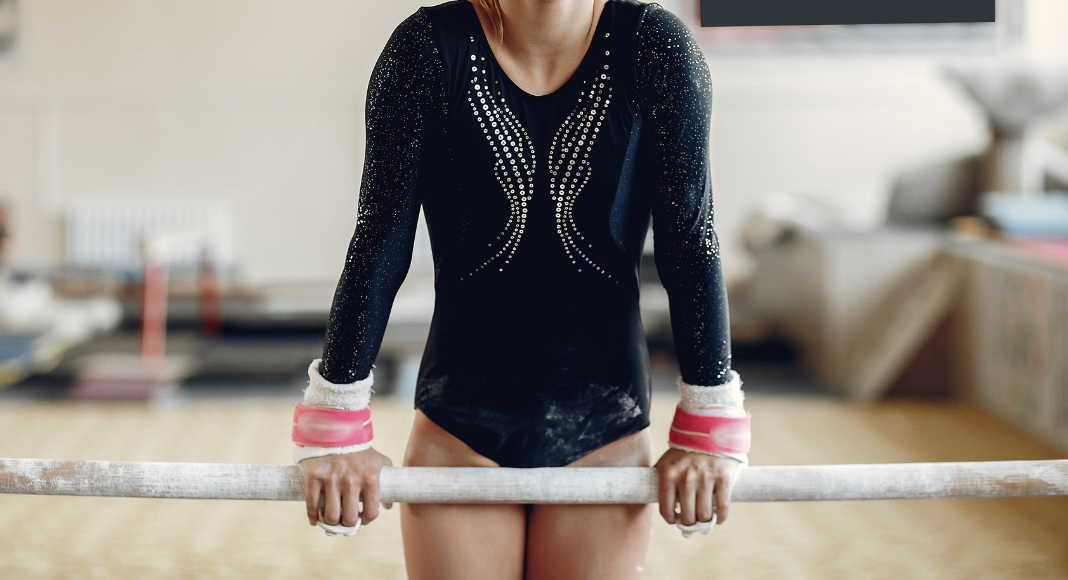 My body shook as I sat there in the cold gym, my eyes fixed on my eight-year-old daughter as she warmed up for her uneven bars routine.
My body shook as I sat there in the cold gym, my eyes fixed on my eight-year-old daughter as she warmed up for her uneven bars routine.
At her first gymnastics meet, I was in the audience, finding it hard to sit still. It was a small meet between two teams in what was meant to be a low-stress introduction to competing.
But to my daughter, this day was the culmination of years of hard work. It was as important as the Olympics.
My daughter had started gymnastics during the winter of first grade, and it had been love at first flip. But just two months into the session, the gym had closed for COVID. Determined to keep improving, my daughter began spending hours in our basement working on cartwheels and round-offs and splits. When a generous neighbor gave us their gymnastics bar, she further increased her efforts, teaching herself moves from YouTube tutorials.
By the time the gym reopened, she’d learned enough skills to focus on her new dream – making the competitive team. Ten months later, she’d earned a spot. And now here she was, preparing to compete in her favorite event.
She looked strong standing there, her eyes aglow with fire. But deep down, I knew she was nervous.
“Mom, I’m scared,” she’d said on the drive up. “I want to win so badly. What if I don’t?”
Her words had scared me too. Until this point, gymnastics had been about learning skills and getting stronger. But now, she would be judged, her results compared to others.
I didn’t want this experience to hurt her confidence, to make her feel anything less than the accomplished, hard-working girl I knew she was.
Nor did I want the pressure of competing to stress her out and make her hate the sport she loved. Telling her winning didn’t matter felt better, but I knew this meet meant a lot to her. I feared downplaying its importance would invalidate her hard work.
So instead, I thought back to my own failures and sat with them until the emotion caused my throat to burn. I thought of what they’d taught me and how they’d hurt. And how all I wanted to do was protect my little girl.
But she didn’t need protection. She needed preparation. And the truth.
“I know you want to win,” I’d said. “And I know you can. But it’s okay if you don’t. Because losing is a necessary part of chasing big dreams. It’s the part that makes you stronger.”
She’d shifted in her seat. “How?” she’d asked.
“Practice strengthens your muscles. Losing strengthens your mind,” I’d said. “It teaches us how to keep going when we’re upset. To try harder instead of quitting. And the best part is, if you think of losing as learning, it’s no longer scary. So instead of worrying about what can go wrong, you can focus your energy on just doing your best.”
“But I still want to win,” she’d said.
“Of course you do! You’re an amazing gymnast! But try not to worry. Just do your best!”
She’d smiled then, and I’d smiled too. Preparations had ended. It was time to cheer her on.
Which was what I was doing when she saluted the judge and pulled herself onto the bar. Within seconds she was whipping her body around it, her legs fused together and perfectly straight. But she was going too fast. Instead of completing one rotation and ending on top of the bar, she completed one and a half, ending with her body beneath it. She tried to pull herself up with her arms, but the momentum was too strong.
Her feet hit the ground.
I gasped, ignoring my own advice as I felt her pain, more piercing than if it were my own.
Then she got back up. Finished strong. And stuck her landing. But she didn’t get the highest score. And for the rest of the competition, I prayed my daughter would be strong enough to handle the disappointment.
It was a feeling I hadn’t expected, this nervous smiling on the sidelines, simultaneously needed and yet unable to comfort her as she stood there with her team.
My nerves didn’t calm until the results came hours later. Third on bars. Second in the all-around.
I was blown away. Thrilled. So proud. Yet, in my daughter’s eyes, I saw sadness. I pretended I didn’t until we made it to the car. There, after congratulating her, I told her I was sorry.
“It’s okay, Mom,” she said, breathing in. “Sometimes gymnasts fall.”
She sounded so mature as she spoke from her booster seat, a stuffed animal nestled in her lap. I wished I wasn’t driving so I could hug her.
There are some lessons I wish I could spare my kids. Learning how to fail is one. And yet I know from failure grows resilience and grit, those very skills that one day will help them soar.
I tried to remember this as I comforted my girl.
“You know, I’ve never been prouder of you than when you fell today,” I said. “Because instead of getting upset, you got back up. That isn’t easy, yet you made it look effortless.”
“It was hard,” she said. “But I just kept thinking of Jade Carey in the Olympics. She got eighth in the all-around and still won gold on the floor. She didn’t win everything, but she still got gold.”
And there was that grit, shining bright. It reminded me of when she’d been a baby, determined to walk at ten months old. No matter how many times she’d fall, she’d always try again, until one day, she took off running. She would do that again here too.
The thought made me smile. “That’s right!” I said. “And one day, you’ll win gold!”
Though I was pretty sure she already had, even if the medal around her neck was silver.
























